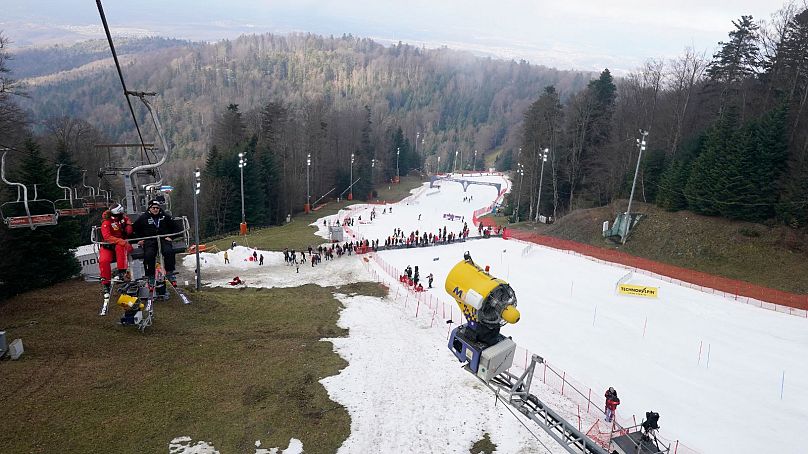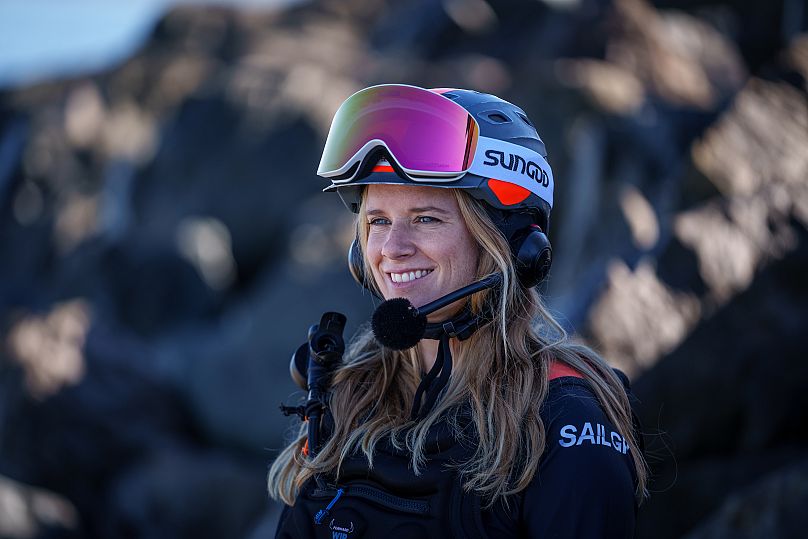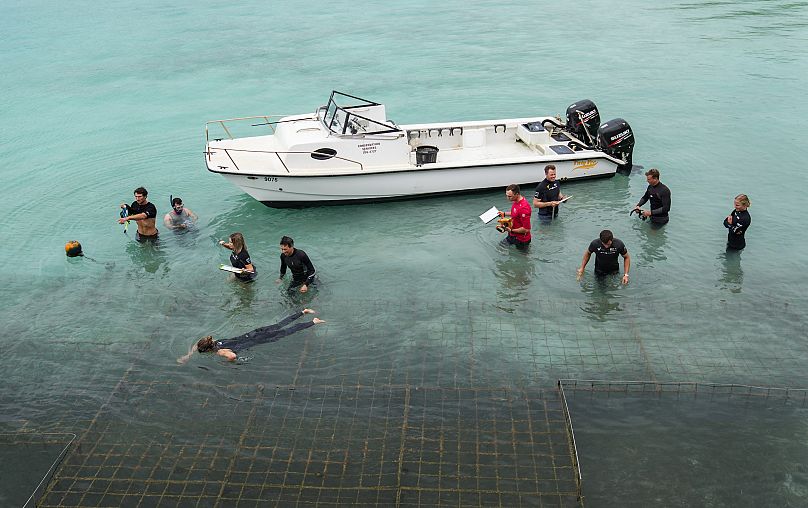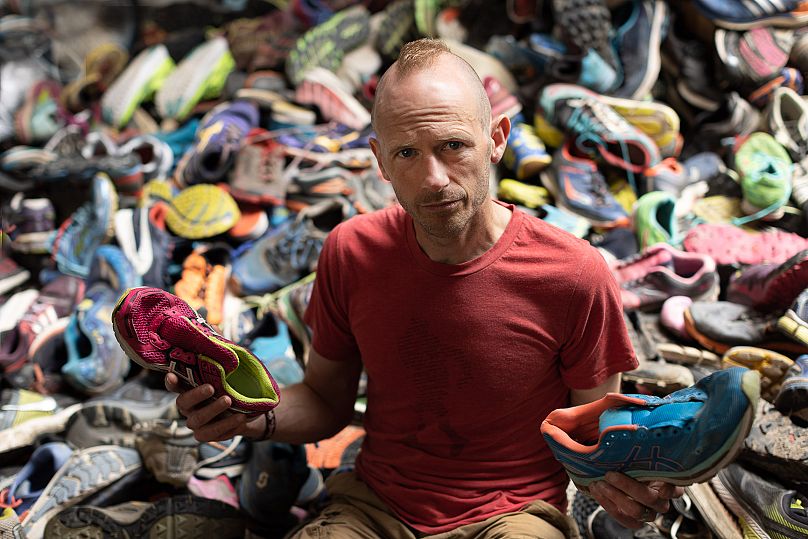
Sport occupies an unusual place in society. It’s simultaneously public and private – something we do for our own personal health, but also a multibillion-dollar industry; both political and apolitical, accessible and exclusive.
This is also why sport straddles such interesting territory when it comes to both the climate and nature crises.
Champions for Earth, an organisation of athletes promoting environmental action, was formed for exactly this reason.
“Climate change affects us all, and in pursuing solutions we must bring as many people together as possible,” their mission statement reads. “We see sport as a piece of that puzzle: unifying people across race, age, gender, sex, religion and disability.”
But, sport, as a sector, is also a major contributor to the damage being done to our planet: from the greenhouse gases emitted from transporting equipment, athletes and fans all over the world, to the harm done to ecosystems by venue construction, high-density events and poor waste management.
Sport is both a ‘victim’ and contributor to climate change

Though it’s impossible to accurately calculate sport’s contribution to global warming and biodiversity loss, some have compared its carbon footprint to that of a country the size of Spain.
Unlike many other industries, however, sport is also often situated on the frontlines of the climate emergency.
We saw this at the Tokyo Olympics in 2021, as athletes passed out and faced serious health problems due to the excessive heat. This was clearer still at the Beijing Winter Olympics a few months later, as the Games became the first in history to rely almost entirely on artificial snow.
In the months since the Olympics, we’ve seen more races and competitions cancelled, relocated and postponed because of the direct effects of climate change.
A recent report from Badvertising argued that many of the major sponsors for winter sports were directly melting the snow necessary for events to take place. Britain’s most successful Winter Olympian Lizzy Yarnold said these deals were “like winter sport nailing the lid on its own coffin.”
“Sport is not just a victim of [climate] change, but an important contributor too,” writes author David Goldblatt in Rapid Transition Alliance’s report into the relationship between sport and climate change.
So how then can sport be used to tackle the environmental issues we’re collectively facing?
Athletes have a ‘unique perspective’

Hannah Mills is the most successful female sailor in Olympic history. After decades spent competing and training on coastlines around the world, the 34-year-old is acutely aware of both the gravity of the climate crisis and the impact major sporting events can have on the planet.
“There’s a big environmental footprint with sport,” Mills says, “so that on the one hand needs to be addressed, by reducing things like emissions and everything we possibly can.”
Her passion for environmentalism stems from a lifelong relationship with the outdoors.
“It’s one big playground that we’re lucky enough to get to use in so many different ways,” she says, “and through sailing you spend so much time outside on the ocean, which is a real privilege… you always have an appreciation for nature and just how vast the ocean is.”
Sport as a tool for finding local solutions
It was what Mills saw at her second Olympic Games in Rio de Janeiro that crystallised for her the severity of our plastic pollution problem.
“I’d never seen anywhere where it was quite so stark,” Mills explains, “everywhere we’d sailed before you’d see the odd piece of plastic floating around, and I wouldn’t necessarily think too much of it. But in Rio… it became too much to ignore.”
Rio’s plastic pollution problem is also a good example of how localised issues – that need localised solutions – sometimes get lost when common environmental issues are considered on a global scale.
Decades of inadequate infrastructure and a lack of funding for waste management have caused the carpets of plastic waste that cover the otherwise beautiful coastline around Rio. But when that messaging gets oversimplified into general conversations about avoiding single-use plastics, rather than tackling the root causes of the specific crisis playing out in Rio, it’s clear to see why this leads to a lack of meaningful action.

This is where Mills feels sport has the opportunity to enact more meaningful change.
“We get this unique perspective and this unique impact as athletes or as sporting events to tell stories – and people, for whatever reason, listen and look up to athletes.”
Mills works with SailGP as the strategist for the Emirates Great Britain team, an international sailing competition that takes place across a season of grand prix events around the world. Similarly to the work being done by Extreme E, SailGP runs outreach initiatives in each racing location – not just to ensure the competition is sustainable, but in an effort to leave a lasting positive legacy.
“A huge part of the climate change narrative is that in every location there will be different solutions that are effective,” says Mills, “it’s about understanding that it’s not a one-size-fits-all.
“Yes, we all need to come together globally in terms of emissions. But actually, in terms of restoring and protecting nature, it’s very location-dependent as to what’s working,” she explains.
Some of SailGP’s local impact projects have included introducing “ecological anchoring” in an effort to preserve and restore seagrass beds off the coast of Saint-Tropez, developing large-scale solar farms in England, and planting native poplar trees in southern Italy.
Bringing the political to the apolitical?
When athletes, coaches or commentators raise issues like the urgent need to address the climate crisis, a common criticism is that this is seen as making a political point within a space that is ostensibly neutral.
We saw this during the Qatar World Cup last year, where athletes wanting to make the vaguest of nods towards Qatar’s atrocious human rights record for LGBTQ+ people were threatened with sanctions.
There are separate conversations to be had about whether environmentalism should be considered political or whether sport has ever been remotely apolitical – but that’s perhaps best left for another time.
Sometimes climate action is seen as sufficiently apolitical to feature in sport, such as Reading FC’s fantastic collaboration with Reading University – incorporating the climate stripes into their kit.
Today @ReadingFC and @ReadingFCWomen unveiled their new home kit for the 2022/23 season, incorporating the climate stripes on the sleeves and shorts.
The stripes used on the kit represent changes in temperature in Reading since the club was founded in 1871.#HoopsForTheFuture pic.twitter.com/W8jFYmFHk5
— Ed Hawkins (@ed_hawkins) July 25, 2022
“I can really see the argument both ways,” Mills says, explaining that “in the field of play” people’s focus should perhaps be entirely on the sport and the competition.
“But I think there’s such an opportunity around athletes in the build-up to big events and in interviews during big events where you can really use your platform.”
For ultramarathon runner Damian Hall, however, sport and climate action are directly entwined. His latest book is even titled ‘We Can’t Run Away From This.’ He also co-founded The Green Runners, a community of running enthusiasts putting the planet first.
Hall recently won the 268-mile (430km) Spine Race – affectionately dubbed ‘Britain’s most brutal race’ – in a gruelling 84 hours and 36 minutes, setting a new men’s course record in the process.
For spectators tracking the runners online, Hall’s profile showed him holding a Just Stop Oil banner – which he later unfurled upon crossing the finish line.
Shout out to @Ultra_Damo for winning the #SpineRace and also props for using his platform to highlight the biggest issues impacting us all@TheGreenRunnerz @JustStop_Oil @runningpunks pic.twitter.com/Jv1dkzxg5P
— Christopher Whitby (@commanderwhitby) January 19, 2023
“This all just feels so urgent,” Hall explains, “my sport is very niche, but there are moments where it might get a little bit of publicity… I guess I’m just desperate and trying to use those moments.”
It was the 2019 Extinction Rebellion protests in London that spurred the father-of-two down this path, catching his attention with their colourful and vibrant nature before driving home the severity of the climate crisis.
“We’ve all seen headlines about polar bears and melting glaciers for years, but it was difficult sometimes to connect that to your life. So those protests made me start to realise how urgent things were and how governments really weren’t acting,” Hall says.
“I also started questioning myself as an athlete,” he continues, “as an elite ultramarathon runner I would fly to on average probably three big, international races a year – in fact in 2019 I flew five times return and hadn’t really given that significant thought.”
Cutting down on flights and picking ethical sponsors

Now, Hall hasn’t flown for three years – opting for domestic races and international events accessible by greener modes of transport. He’s part of a small but growing field of athletes turning down opportunities to compete abroad. Despite having a list of events he’d always wanted to do – such as one on Reunion Island in the Indian Ocean – he says he now “can’t justify that to myself.”
One of Great Britain’s leading junior athletes, Innes FitzGerald, recently made headlines after declining to compete in Australia because of the environmental impact of travelling halfway around the world.
“The reality of the travel fills me with deep concern,” she said in a letter to British Athletics. “I was just nine when the COP21 Paris climate agreement was signed. Now, eight years on, global emissions have been steadily increasing, sending us on a path to climate catastrophe.”
However, Hall hasn’t written off flying entirely.
“I don’t think I should have to sacrifice my entire career,” he says, explaining that there are a handful of key races – largely in the US – that he still hopes to do.
It’s also through his sponsors where Hall feels he can help effect real change. He’s meticulous about the companies he partners with, turning down sponsorships and funding when organisations aren’t engaging meaningfully with environmental issues.
“I thought it would make me kind of unpopular, but it’s actually sort of had the opposite effect,” he explains, “I’ve found some companies have approached me because they want to work with me because of my ethics.”
Though Hall is extremely humble about his impact, the kind of companies he deals with are sometimes major sportswear manufacturers and suppliers.
“It’s nudging for systemic change that is going to have the most impact.”
Source: Euronews





